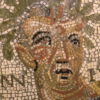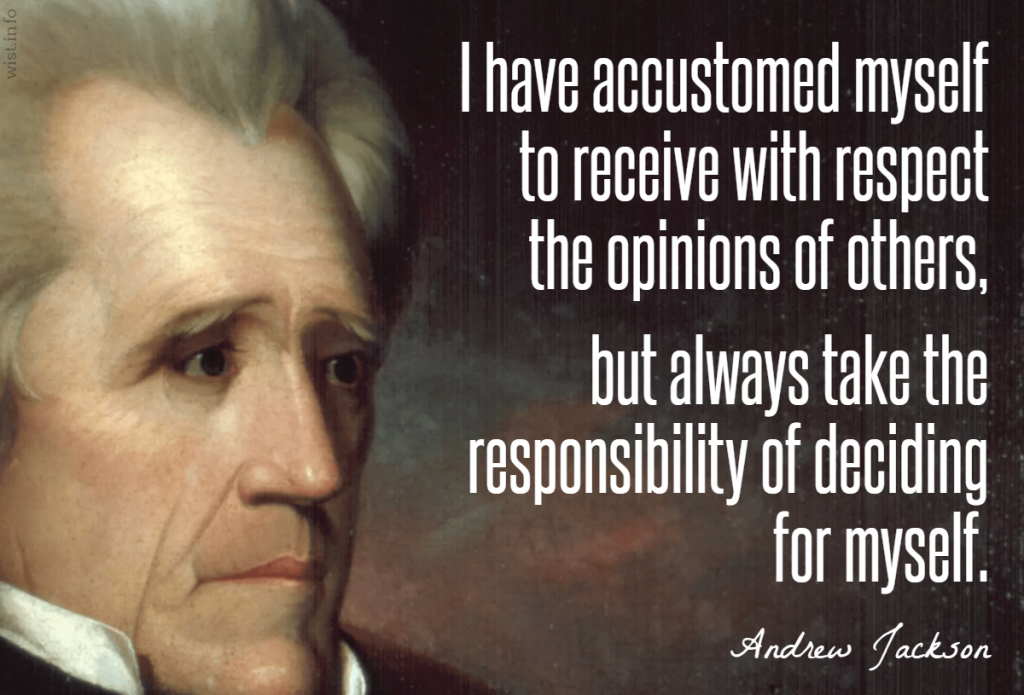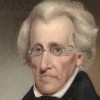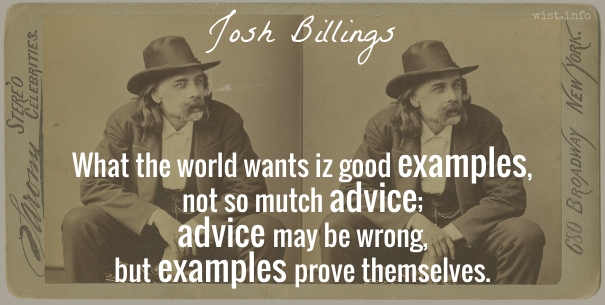Advice iz like kastor-ile, eazy enuff to give, but dredful uneazy tew take.
[Advice is like castor oil, easy enough to give, but dreadfully uneasy to take.]
Josh Billings (1818-1885) American humorist, aphorist [pseud. of Henry Wheeler Shaw]
Everybody’s Friend, Or; Josh Billing’s Encyclopedia and Proverbial Philosophy of Wit and Humor, ch. 148 “Affurisms: Ink Brats” (1874)
(Source)
The phrase also shows up twice in Wit and Wisdom of Josh Billings (1913) [ed. H. Montague] (which, being published in England, did away with the misspellings):
Advice is like castor oil -- easy enough to give but dreadful hard to take.
["Advice"]
Advice is like castor oil -- awful easy to give but mighty hard to take.
["How to Select a Husband"]
Quotations about:
advice
Note not all quotations have been tagged, so Search may find additional quotes on this topic.
The truly conscientious will not limit themselves to helping with the more exciting parts of one’s life. They are also scrupulous about offering helpful suggestions regarding such mundane matters as your household arrangements, work habits, mannerisms, and use of the language. There is nothing like a good friend to help you out when you are not in trouble.
Judith Martin (b. 1938) American author, journalist, etiquette expert [a.k.a. Miss Manners]
Miss Manners’ Guide for the Turn-of-the-Millennium, Part 1 “Revised Conventions,” “Advice” (1989)
(Source)
LEONATO: No, no, t’is all men’s office to speak patience
To those that wring under the load of sorrow;
But no man’s virtue nor sufficiency,
To be so moral, when he shall endure
The like himself.William Shakespeare (1564-1616) English dramatist and poet
Much Ado About Nothing, Act 5, sc. 1, l. 29ff (5.1.29-33) (1598)
(Source)
LEONATO:For, brother, men
Can counsel, and speak comfort to that grief
Which they themselves not feel.William Shakespeare (1564-1616) English dramatist and poet
Much Ado About Nothing, Act 5, sc. 1, l. 22ff (5.1.22-24) (1598)
(Source)
No one is more susceptible to an experts fearmongering than a parent. Fear is in fact a major component of the act of parenting. A parent, after all, is the steward of another creature’s life, a creature who in the beginning is more helpless than the newborn of nearly any other species. This leads a lot of parents to spend a lot of their parenting energy simply being scared.
Steven Levitt (b. 1967) American economist and author
Freakonomics, ch. 5 “What Makes A Perfect Parent?” (2005) [with Stephen Dubner]
(Source)
It iz a darned sight eazier tew find six men who kan tell exactly how a thing ought tew be did than tew find one who will do it.
[It is a darned sight easier to find six men who can tell exactly how a thing ought to be done than to find one who will do it.]
Josh Billings (1818-1885) American humorist, aphorist [pseud. of Henry Wheeler Shaw]
Everybody’s Friend, Or; Josh Billing’s Encyclopedia and Proverbial Philosophy of Wit and Humor, ch. 130 “Affurisms: Puddin & Milk” (1874)
(Source)
ORSINA: Better counsel comes overnight.
[Besserer Rat kommt über Nacht.]Gotthold Lessing (1729-1781) German playwright, philosopher, dramaturg, writer
Emilia Galotti, Act 4, sc. 3 (1772)
It is unclear if this is a traditional German saying, or was coined by Lessing. There are parallels in other languages (as well as German), but I did not find a German reference in these words that predates this play.
(Source (German))
Better counsel comes with the night.
[Source (1842)]
Morning brings better counsel.
[tr. Lewes/Taylor (1890)]
Better counsel often comes by night.
[tr. Gode-von Aesch (1959?)]
My daddy always told me to just do the best you knew how and tell the truth. He said there was nothin to set a man’s mind at ease like wakin up in the morning and not havin to decide who you were.
Cormac McCarthy (1933-2023) American novelist, playwright, screenwriter
No Country for Old Men (2007)
(Source)
Altho’ thy Teacher act not as he preaches,
Yet ne’ertheless, if good, do what he teaches;
Good Counsel, failing Men may give; for why,
He that’s aground knows where the Shoal doth lie.
My old Friend Berryman, oft, when alive,
Taught others Thrift; himself could never thrive:
Thus like the Whetstone, many Men are wont
To sharpen others while themselves are blunt.Benjamin Franklin (1706-1790) American statesman, scientist, philosopher, aphorist
Poor Richard (1734 ed.)
(Source)
There are some men who listen neither to reason nor to good advice, and who deliberately go astray through fear of being dominated.
[Il se trouve des hommes qui n’écoutent ni la raison ni les bons conseils, et qui s’égarent volontairement par la crainte qu’ils ont d’être gouvernés.]
Jean de La Bruyère (1645-1696) French essayist, moralist
The Characters [Les Caractères], ch. 4 “Of the Affections [Du Coeur],” § 71 (4.71) (1688) [tr. Stewart (1970)]
(Source)
(Source (French)). Alternate translations:
There are those men who will not hearken to reason, or good council, but deviate of their own Heads, purely for fear of being govern'd.
[Bullord ed. (1696)]
There are some Men who will not hearken to Reason and good Counsel, but deviate of their own Heads, purely for fear of being govern'd.
[Curll ed. (1713)]
There are some Men who turn the deaf Ear to Reason and friendly Counsel, and play the Fool of their own Heads, purely for fear of being governed.
[Browne ed. (1752)]
There are some men who turn a deaf ear to reason and good advice, and willfully go wrong for fear of being controlled.
[tr. Van Laun (1885)]
What wouldest thou have me follow? what my enemies think prudent, or what I myself think to be so?
[Que veux-tu que je suive, la prudence de mes ennemis, ou la mienne?]
Charles-Lewis de Secondat, Baron de Montesquieu (1689-1755) French political philosopher
Persian Letters [Lettres Persanes], Letter 8, Usbek to Rustan (1721) [tr. Floyd (1762)]
(Source)
(Source (French)). Alternate translations:
What wouldst thou have me pursue; the Prudence of my Enemies, or my own?
[tr. Ozell (1736)]
Which would you have me obey -- the petty maxims that guide my enemies, or the dictates of my own free soul?
[tr. Davidson (1891)]
Which would you have me accept as a guide, -- the foresight of my enemies or my own?
[tr.https://archive.org/details/persianletters00degoog/page/n52/mode/2up?q=%22accept+as+a+guide%22">Betts (1897)]
Would you have me follow my own counsel or that of my enemies?
[tr. Healy (1964)]
Ought I to heed my enemies' prudent counsels or my own?
[tr. Mauldon (2008)]
Which would you have me follow, Rustan, my own counsel, or that of my enemies?
[tr. MacKenzie (2014)]
Princes like to be helped, but not surpassed. When you counsel someone, you should appear to be reminding him of something he had forgotten, not of the light he was unable to see.
[Gustan de ser ayudados los príncipes, pero no excedidos, y que el aviso haga antes viso de recuerdo de lo que olvidaba que de luz de lo que no alcanzó.]
Baltasar Gracián y Morales (1601-1658) Spanish Jesuit priest, writer, philosopher
The Art of Worldly Wisdom [Oráculo Manual y Arte de Prudencia], § 7 (1647) [tr. Maurer (1992)]
(Source)
(Source (Spanish)). Alternate translations:
Princes are willing to be assisted, but not surpassed. Those who advise them ought to speak as if they put them in mind of what they forgot, and not as teaching them what they knew not.
[Flesher ed. (1685)]
They [princes] will allow a man to help them but not to surpass them, and will have any advice tendered them appear like a recollection of something they have forgotten rather than as a guide to something they cannot find.
[tr. Jacobs (1892)]
They [kings] may abide being helped, but not surpassed, wherefore let advice given them appear more a jog to what they forgot, than a light to what they could not find.
[tr. Fischer (1937)]
But to give one’s advice to others, unasked, is, in effect, to declare that we are much wiser than those to whom we give it; and is a kind of reproaching them with their ignorance and inexperience.
[Il proferire il tuo consiglio non richiesto niuna altra cosa è che un dire di esser più savio di colui cui tu consigli, anzi un rimproverargli il suo poco sapere e la sua ignoranza.]
Giovanni della Casa (1503-1556) Florentine poet, author, diplomat, bishop
Galateo: Or, A Treatise on Politeness and Delicacy of Manners [Il Galateo overo de’ costumi], ch. 18 (1558) [tr. Graves (1774)]
(Source)
(Source (Italian)). Alternate translations:
To offer advise, unrequested: what is it els but to vaunt youre selfe wiser then he is, whom you do counsell : nay rather it is a plaine checke to him, for his Ignoraunce and folly.
[tr. Peterson (1576)]
To offer your advice unasked, is nothing else than to assert that you are wiser than he to whom you offer it.
[Source (1909)]
To offer your advice without having been asked is nothing else but a way of saying that you are wiser than the man to whom you are giving advice, and even a way of reprimanding him for his limited knowledge and his ignorance.
[tr. Eisenbichler/Bartlett (1986)]
The gifts and the lessons my father left me will last forever: Never take yourself too seriously, never miss a chance to laugh long and hard, speak out about political and social issues you believe in, use the written word as often as you can to make yourself and the world a better place, and love your children with all you’ve got.
Rod Serling (1924-1975) American screenwriter, playwright, television producer, narrator
Paraphrase of Rod Serling in Anne Serling, As I Knew Him: My Dad, Rod Serling, Epilogue (2013)
(Source)
I had hardly thought by asking
For five hundred I’d be tasking
The kindness of a rich old friend like you.
“Practice law,” you said, “it’s healthy,
And it soon will make you wealthy.”
Now, Gaius, tell me “Yes,” not what to do.[Mutua viginti sestertia forte rogabam,
Quae vel donanti non grave munus erat.
Quippe rogabatur felixque vetusque sodalis
Et cuius laxas arca flagellat opes.
Is mihi ‘Dives eris, si causas egeris’ inquit.
Quod peto da, Gai: non peto consilium.]Martial (AD c.39-c.103) Spanish Roman poet, satirist, epigrammatist [Marcus Valerius Martialis]
Epigrams [Epigrammata], Book 2, epigram 30 (2.30) (AD 86) [tr. Nixon (1911), “Neither a Borrower”]
(Source)
"To Caius/Gaius." (Source (Latin)). Alternate translations:
When twenty pounds I'd borrow of a friend,
One, who might give me more, as well as lend;
Blest in his fortune; my companion old;
Whose coffers, and whose purse-strings, crack with gold.
"Turn lawyer, and you'll soon grow rich," he cries:
Give me what I ask, my friend: -- 'tis not advice.
[tr. Hay (1755)]
Of sesterces a score I crave in loan,
Which scarce a boon would honest bounty own.
A fortune-blest old intimate I urge,
Whose gen'rous wealth tyrannic coffers scourge.
"Go, ply the bar: be affluent in a trice."
I ask your aid, my Cay, not your advice.
[tr. Elphinston (1782), Book 5, ep. 31]
I asked Caius to lend me twenty sestertia, a sum which could not weigh heavy on him, even if he had been asked to give and not to lend; for he was my old companion, and hd been fortunate in life; and his chest can scarcely press down his overflowing riches. He replied to me, "You will become wealthy if you will take to pleading causes." Caius! give me what I ask for, I do not ask for advice.
[tr. Amos (1858), "Unseasonable Advice"; ch. 3, ep. 89]
I asked, by chance, a loan of twenty thousand sesterces, which would have been no serious matter even as a present. He whom I asked was an old acquaintance in good circumstances, whose money-chest finds difficulty in imprisoning his overflowing hoards. "You will enrich yourself, was his reply, "if you will go to the bar." Give me, Caius, what I ask: I do not ask advice.
[tr. Bohn's Classical (1859)]
I asked, as it chanced, the loan of twenty thousand sesterces, which, even to a give, would have been no burden. The fact was I asked them of a well-to-do and old friend, and one whose money-chest keeps in control o'erflowing wealth. His answer was, "You will be rich if you plead causes." Give me what I ask, Gaius: I don't ask for advice.
[tr. Ker (1919)]
I chanced to ask a loan -- a hundred, merely;
E'en as a gift that should not task severely
A wealthy friend, and so I asked him, knowing
His pockets bulge with cash over-flowing.
"Go to the Bar," says he, "get rich by pleading" --
'Tis cash, not counsel, Gaius, that I'm needing.
[tr. Pott & Wright (1921)]
I asked you twenty thousand as a loan,
A trifle, had I craved it for my own,
Such claim might ancient friendship well afford
On one whose coffers chid their bursting hoard.
"Plead and you'll make a fortune in a trice."
I want your money, Gaius, not advice.
[tr. Francis & Tatum (1924), ep. 79]
I asked a rich old friend of mine
for a loan of twenty thousand:
No trouble at all for him to give it to me,
he was so loaded. But in answer to my request
he said, "You know what? You want to make money?
Become a lawyer." Look, Gaius:
I asked you for money, not for advice.
[tr. Bovie (1970)]
I happened to ask a Ioan of twenty thousand sesterces, no burdensome present even as a gift. He of whom I asked it was a faithful old friend, he whose coffer whips up his ample wealth. Says he to me: "You'll be a rich man if you plead cases." Give me what I ask, Gaius; I'm not asking advice.
[tr. Shackleton Bailey (1993)]
I need a loan of twenty grand.
Can you lend a helping hand?
We're friends, it's not a huge amount
Against your massive bank account.
But your reply? "Go practice law,
it's easy to get rich, ha-ha!"
So here's a thought on which to chew:
No job advice I asked from you.
[tr. Ericsson (1995)]
I chanced to seek a loan of twenty thousand --
which one could give away and not think twice.
The man I asked, a trusted longtime friend,
whose strongbox whips up riches in a trice,
said, "Be a lawyer. You'll make piles of cash."
I asked for money, Gaius, not advice.
[tr. McLean (2014)]
“The choice is yours: to go or wait.”
“And it is also said,” answered Frodo: “Go not to the Elves for counsel, for they will say both no and yes.”
“Is it indeed?” laughed Gildor. “Elves seldom give unguarded advice, for advice is a dangerous gift, even from the wise to the wise, and all courses may run ill.”
J.R.R. Tolkien (1892-1973) English writer, fabulist, philologist, academic [John Ronald Reuel Tolkien]
The Lord of the Rings, Vol. 1: The Fellowship of the Ring, Book 1, ch. 3 “Three Is Company” (1954)
(Source)
You will always find some Eskimos ready to instruct the Congolese on how to cope with heat waves.
Stanislaw Lec (1909-1966) Polish aphorist, poet, satirist
Unkempt Thoughts [Myśli nieuczesane] (1957) [tr. Gałązka (1962)]
(Source)
This is all I had to say on friendship. One piece of advice on parting. Make up your minds to this. Virtue (without which friendship is impossible) is first; but next to it, and to it alone, the greatest of all things is Friendship.
[Haec habui de amicitia quae dicerem. Vos autem hortor ut ita virtutem locetis, sine qua amicitia esse non potest, ut ea excepta nihil amicitia praestabilius putetis.]
Marcus Tullius Cicero (106-43 BC) Roman orator, statesman, philosopher
Laelius De Amicitia [Laelius on Friendship], ch. 27 / sec. 104 (44 BC) [tr. Shuckburgh (1909)]
(Source)
Original Latin. Alternate translations:
Such are the remarks I had to make on friendship. But as for you, I exhort you to lay the foundations of virtue, whithout which friendship can not exist, in such a matter that, with this one exception, you may consider that nothing in the world is more excellent than friendship.
[tr. Edmonds (1871)]
I had these things to say to you about friendship; and I exhort you that you so give the foremost place to virtue without which friendship cannot be, that with the sole exception of virtue, you may think nothing to be preferred to friendship.
[tr. Peabody (1887)]
This is all that I had to say about friendship; but I exhort you both so to esteem virtue (without which friendship cannot exist), that, excepting virtue, you will think nothing more excellent than friendship.
[tr. Falconer (1923)]
Be warned against all “good” advice because “good” advice is necessarily “safe” advice, and though it will undoubtedly follow a sane pattern, it will very likely lead one into total sterility — one of the crushing problems of our time.
Jules Feiffer (b. 1929) American cartoonist, authork, satirist
Interview by Roy Newquist, Counterpoint (1964)
(Source)
I will leave it for the present, as this letter is already pretty long. Such is my desire, my anxiety for your perfection, that I never think I have said enough, though you may possibly think I have said too much; and though, in truth, if your own good sense is not sufficient to direct you, in many of these plain points, all that I or anybody else can say will be insufficient.
Lord Chesterfield (1694-1773) English statesman, wit [Philip Dormer Stanhope]
Letter to his son, #168 (18 Nov 1748)
(Source)
Chesterfield repeats the sentiment in a later letter, #194 (22 Sep 1749):
This letter is a very long, and so possibly a very tedious one; but my anxiety for your perfection is so great, and particularly at this critical and decisive period of your life, that I am only afraid of omitting, but never of repeating or dwelling too long upon anything that I think may be of the least use to you.
“So, Jeeves!”
“Yes, sir.”
“What do you mean. Yes, sir?”
“I was endeavouring to convey my appreciation of the fact that your position is in many respects somewhat difficult, sir. But I wonder if I might call your attention to an observation of the Emperor Marcus Aurelius. He said: ‘Does aught befall you? It is good. It is part of the destiny of the Universe ordained for you from the beginning. All that befalls you is part of the great web.'”
I breathed a bit stertorously.
“He said that, did he?”
“Yes, sir.”
“Well, you can tell him from me he’s an ass.”
P. G. Wodehouse (1881-1975) Anglo-American humorist, playwright and lyricist [Pelham Grenville Wodehouse]
The Mating Season, ch. 4 (1949)
(Source)
Adapted from Marcus Aurelius, Meditations, Book 4, #26 [tr. Rendall (1901)].
Wodehouse uses in "Ordeal by Golf" (1919) a similar sentiment from Meditations, Book 10, #5, to suggest Marcus Aurelius was a golfer.
Imitate the spirit of Marcus Aurelius. "Whatever may befall thee," says that great man in his "Meditations," "it was preordained for thee from everlasting. Nothing happens to anybody which he is not fitted by nature to bear." I like to think that this noble thought came to him after he had sliced a couple of new balls into the woods, and that he jotted it down on the back of his score-card.
TIRESIAS: Oh god, is there a man alive who knows, who actually believes …
CREON: What now? What earth-shattering truth are you about to utter?
TIRESIAS: … just how much a sense of judgment, wisdom is the greatest gift we have?
CREON: Just as much, I’d say, as a twisted mind is the worst affliction known.
TIRESIAS: You’re the one who’s sick, Creon, sick to death.[Τειρεσίας: φεῦ. ἆρ᾽ οἶδεν ἀνθρώπων τις, ἆρα φράζεται,
Κρέων: τί χρῆμα; ποῖον τοῦτο πάγκοινον λέγεις;
Τειρεσίας: ὅσῳ κράτιστον κτημάτων εὐβουλία;
Κρέων: ὅσῳπερ, οἶμαι, μὴ φρονεῖν πλείστη βλάβη.
Τειρεσίας: ταύτης σὺ μέντοι τῆς νόσου πλήρης ἔφυς.]Sophocles (496-406 BC) Greek tragic playwright
Antigone, l. 1048ff (441 BC) [tr. Fagles (1982), l. 1162ff]
(Source)
Original Greek. Alternate translations:
TEIRESIAS: Oh! What man is there that knows? who that considers --
KREON: In what? thou askest comprehensive questions.
TEIRESIAS: How far the best of goods good counsel is?
KREON: As far as folly is the greatest loss.
TEIRESIAS: Well, though, at least hast caught that grievous ailment.
[tr. Donaldson (1848), l. 1015]
TEIRESIAS: Alas! doth any know and lay to heart --
CREON: Is this the prelude to some hackneyed saw?
TEIRESIAS: How far good counsel is the best of goods?
CREON: True, as unwisdom is the worst of ills.
TEIRESIAS: Thou art infected with that ill thyself.
[tr. Campbell (1873)]
TIRESIAS: Ah! where is wisdom? who considereth?
CREON: Wherefore? what means this universal doubt?
TIRESIAS: How far the best of riches is good counsel!
CREON: As far as folly is the mightiest bane.
TIRESIAS: Yet thou art sick of that same pestilence.
[tr. Storr (1859)]
TEIRESIAS: Alas! Does any man know, does any consider --
CREON: What is this? What universal truth are you announcing?
TEIRESIAS: -- by how much the most precious of our possessions is the power to reason wisely?
CREON: By as much, I think, as senselessness is the greatest affliction.
TEIRESIAS: Yet you came into being full of that disease.
[tr. Jebb (1891)]
TEIRESIAS: Alas! Doth any man know, doth any consider ...
CREON: Whereof? What general truth dost thou announce?
TEIRESIAS: How precious, above all wealth, is good counsel.
CREON: As folly, I think, is the worst mischief.
TEIRESIAS: Yet thou art tainted with that distemper.
[tr. Jebb (1917)]
TEIRESIAS: Ah Creon! Is there no man left in the world --
CREON: To do what? -- Come, let’s have the aphorism!
TEIRESIAS: No man who knows that wisdom outweighs any wealth?
CREON: As surely as bribes are baser than any baseness.
TEIRESIAS: You are sick, Creon! You are deathly sick!
[tr. Fitts/Fitzgerald (1939), l. 825ff]
TEIRESIAS: Ah, is there any wisdom in the world?
CREON: Why, what is the meaning of that wide-flung taunt?
TEIRESIAS: What prize outweighs the priceless worth of prudence?
CREON: Ay, what indeed? What mischief matches the lack of it?
TEIRESIAS: And there you speak of your own symptom, sir.
[tr. Watling (1947)]
TEIRESIAS: Alas! What man can tell me, has he thought at all ...
CREON: What hackneyed saw is coming from your lips?
TEIRESIAS: How better than all wealth is sound good counsel.
CREON: And so folly worse than anything.
TEIRESIAS: And you're infected with that same disease.
[tr. Wyckoff (1954)]
TEIRESIAS: Does any man reflect, does any know ...
CREON: Know what? Why do you preach at me like this?
TEIRESIAS: How much the greatest blessing is good counsel?
CREON: As much, I think, as folly is his plague.
TEIRESIAS: Yet with this plague you are yourself infected.
[tr. Kitto (1962)]
TIRESIAS: This is very sad: Does any human being know, or even question ...
CREON: What's this? More of your great "common knowledge"?
TIRESIAS: How powerful good judgment is, compared to wealth.
CREON: Exactly. And no harm compares with heedlessness.
TIRESIAS: Which runs through you like the plague.
[tr. Woodruff (2001)]
TIRESIAS: Pheu, does any man know, does he consider ...
CREON: Just what? What old saw are you saying?
TIRESIAS: by how much the best of possessions is good counsel?
CREON: By as much, I suppose, as not to have sense is the greatest harm.
TIRESIAS: You certainly were full of this sickness.
[tr. Tyrell/Bennett (2002)]
TEIRESIAS: Is there no one who ... does no one know ... Speak up! Speak up!
CREON: What? What are you trying to say to us?
TEIRESIAS: What? What I’m trying to tell you, Creon, is that man’s best endowment is wisdom.
CREON: Just as idiocy is our worst curse.
TEIRESIAS: You’re possessed by this illness to the full.
[tr. Theodoridis (2004)]
TEIRESIAS: Alas, does any man know or think about ...
CREON: Think what? What sort of pithy common thought are you about to utter?
TEIRESIAS: ... how good advice is valuable -- worth more than all possessions.
CREON: I think that’s true, as much as foolishness is what harms us most.
TEIRESIAS: Yet that’s the sickness now infecting you.
[tr. Johnston (2005)]
TIRESIAS: Does any man know, does any consider ...
CREON: What thing? What great aphorism will you speak?
TIRESIAS: ... how much prudence is the greatest of possessions?
CREON: As much as stupidity is the worst hurt?
TIRESIAS: You certainly seem full of this disease.
[tr. Thomas (2005)]
I think, for what my young opinion’s worth,
That good as it is to have infallible wisdom,
Since this is rarely found, the next best thing
Is to be willing to listen to wise advice.[γνώμη γὰρ εἴ τις κἀπ᾽ ἐμοῦ νεωτέρου
πρόσεστι, φήμ᾽ ἔγωγε πρεσβεύειν πολὺ
φῦναι τὸν ἄνδρα πάντ᾽ ἐπιστήμης πλέων:
εἰ δ᾽ οὖν, φιλεῖ γὰρ τοῦτο μὴ ταύτῃ ῥέπειν,
καὶ τῶν λεγόντων εὖ καλὸν τὸ μανθάνειν.]Sophocles (496-406 BC) Greek tragic playwright
Antigone, l. 719ff [Haemon] (441 BC) [tr. Watling (1947)]
(Source)
Original Greek. Alternate translations:
For, if grounded maxims
May find their utterance e'en in me your son,
I dare be bold to say 'tis better far
That understanding should be born in man:
But if this may not be: -- and, to say sooth,
The common scale inclines not thus, -- 'tis well
To learn from any one who reasons soundly.
[tr. Donaldson (1848)]
For, if one young in years may claim some sense,
I'll say 'tis best of all to be endowed
With absolute wisdom; but, if that's denied,
(And nature takes not readily that ply)
Next wise is he who lists to sage advice.
[tr. Campbell (1873)]
If any judgement hath informed my youth,
I grant it noblest to be always wise,
But, -- for omniscience is denied to man --
Tis good to hearken to admonishment.
[tr. Storr (1859)]
For if even from me, a younger man, a worthy thought may be supplied, by far the best thing, I believe, would be for men to be all-wise by nature. Otherwise -- since most often it does not turn out that way -- it is good to learn in addition from those who advise you well.
[tr. Jebb (1891)]
For if I, a younger man, may offer my thought, it were far best, I ween, that men should be all-wise by nature; but, otherwise -- and oft the scale inclines not so -- 'tis good also to learn from those who speak aright.
[tr. Jebb (1917)]
I know I am young; but please let me say this: The ideal condition
Would be, I admit, that men should be right by instinct;
But since we are all too likely to go astray,
The reasonable thing is to learn from those who can teach.
[tr. Fitts/Fitzgerald (1939), l. 578ff]
Young as I am, if I may give advice,
I'd say it would be best if men were born
perfect in wisdom, but failing this
(which often fails) it can be no dishonor
to learn from others when they speak good sense.
[tr. Wyckoff (1954)]
If one who is still young can speak with sense,
Then I would say that he does best who has
Most understanding; second best, the man
Who profits from the wisdom of another.
[tr. Kitto (1962)]
I'm young, I know, but let me offer this:
it would be best by far, I admit,
if a man were born infallible, right by nature.
If not -- and things don't often go that way --
it's best to learn from those with good advice.
[tr. Fagles (1982), l. 805ff]
For if an opinion comes up from me, a younger person,
I say it is by far best that a man be born filled with
wisdom. If he is not, for the scale does not usually so incline,
to learn from those speaking competently is a noble thing.
[tr. Tyrell/Bennett (2002)]
I’m younger, I know but I still might be able to judge what’s right and I say that it’s a good thing for a man to be born with all possible wisdom but still -- because it’s not such a common thing -- to be able to learn from others.
[tr. Theodoridis (2004)]
For if I, as a younger man, may state
my views, I’d say it would be for the best
if men by nature understood all things --
if not, and that is usually the case,
when men speak well, it good to learn from them.
[tr. Johnston (2005)]
Even though I'm young, a good idea might come from me: It would be best by far that man be born full of all the knowledge there is, but, if it usually happens not to turn out that way, to learn from those who speak well is a good substitute.
[tr. Thomas (2005)]
Though great in all, thou seem’st averse to lend
Impartial audience to a faithful friend:
To gods and men thy matchless worth is known,
And every art of glorious war thy own;
But in cool thought and counsel to excel,
How widely differs this from warring well!
Content with what the bounteous gods have given,
Seek not alone to engross the gifts of heaven.
To some the powers of bloody war belong,
To some, sweet music, and the charm of song;
To few, and wondrous few, has Jove assigned
A wise, extensive, all-considering mind;
Their guardians these the nations round confess,
And towns and empires for their safety bless.[Ἕκτορ ἀμήχανός ἐσσι παραρρητοῖσι πιθέσθαι.
οὕνεκά τοι περὶ δῶκε θεὸς πολεμήϊα ἔργα
τοὔνεκα καὶ βουλῇ ἐθέλεις περιίδμεναι ἄλλων:
ἀλλ᾽ οὔ πως ἅμα πάντα δυνήσεαι αὐτὸς ἑλέσθαι.
ἄλλῳ μὲν γὰρ ἔδωκε θεὸς πολεμήϊα ἔργα,
ἄλλῳ δ᾽ ὀρχηστύν, ἑτέρῳ κίθαριν καὶ ἀοιδήν,
ἄλλῳ δ᾽ ἐν στήθεσσι τιθεῖ νόον εὐρύοπα Ζεὺς
ἐσθλόν, τοῦ δέ τε πολλοὶ ἐπαυρίσκοντ᾽ ἄνθρωποι,
καί τε πολέας ἐσάωσε, μάλιστα δὲ καὐτὸς ἀνέγνω.]Homer (fl. 7th-8th C. BC) Greek author
The Iliad [Ἰλιάς], Book 13, l. 726ff (13.726) (c. 750 BC) [tr. Pope (1715-20)]
(Source)
Polydamas, suggesting Hector accept counsel from others. Original Greek. Alt. trans.:
Hector, still impossible ’tis to pass
Good counsel upon you. But say some God prefers thy deeds,
In counsels wouldst thou pass us too? In all things none exceeds.
To some God gives the pow’r of war, to some the sleight to dance,
To some the art of instruments, some doth for voice advance;
And that far-seeing God grants some the wisdom of the mind,
Which no man can keep to himself, that, though but few can find,
Doth profit many, that preserves the public weal and state,
And that, who hath, he best can prize.
[tr. Chapman (1611), l. 646ff]
Hector! Thou ne’er canst listen to advice;
But think’st thou, that if heaven in feats of arms
Give thee pre-eminence, thou must excel
Therefore in council also all mankind?
No. All-sufficiency is not for thee.
To one, superior force in arms is given,
Skill to another in the graceful dance,
Sweet song and powers of music to a third,
And to a fourth loud-thundering Jove imparts
Wisdom, which profits many, and which saves
Whole cities oft, though reverenced but by few.
[tr. Cowper (1791), l. 877ff]
Hector, thou art impossible to be persuaded by advice. Because indeed a god hath given thee, above others, warlike deeds, for this reason dost thou also desire to be more skilled than others in counsel? But by no means canst thou thyself obtain all things at once. To one indeed hath the deity given warlike deeds; to another dancing; and to another the harp and singing. To another again far-sounding Jove implants a prudent mind in his bosom, of which many men reap the advantage, as it even preserves cities; and he himself who possesses it especially knows its value.
[tr. Buckley (1860)]
Hector, I know thee, how unapt thou art
To hearken to advice; because the Gods
Have giv’n thee to excel in warlike might,
Thou deemest thyself, in counsel too, supreme;
Yet every gift thou canst not so combine:
To one the Gods have granted warlike might,
To one the dance, to one the lyre and song;
While in another’s breast all-seeing Jove
Hath plac’d the spirit of wisdom, and a mind
Discerning, for the common good of all:
By him are states preserv’d; and he himself
Best knows the value of the precious gift.
[tr. Derby (1864)]
Hector, thou art hard to be persuaded by them that would counsel thee; for that god has given thee excellence in the works of war, therefore in council also thou art fain to excel other men in knowledge. But in nowise wilt thou be able to take everything on thyself. For to one man has god given for his portion the works of war, to another the dance, to another the lute and song, but in the heart of yet another hath far-seeing Zeus placed an excellent understanding, whereof many men get gain, yea he saveth many an one, and himself best knoweth it.
[tr. Leaf/Lang/Myers (1891)]
Hector, there is no persuading you to take advice. Because heaven has so richly endowed you with the arts of war, you think that you must therefore excel others in counsel; but you cannot thus claim preeminence in all things. Heaven has made one man an excellent soldier; of another it has made a dancer or a singer and player on the lyre; while yet in another Jove has implanted a wise understanding of which men reap fruit to the saving of many, and he himself knows more about it than any one.
[tr. Butler (1898)]
Hector, hard to deal with art thou, that thou shouldest hearken to words of persuasion. Forasmuch as god has given to thee as to none other works of war, therefore in counsel too art thou minded to have wisdom beyond all; but in no wise shalt thou be able of thine own self to compass all things. To one man hath God given works of war, to another the dance, to another the lyre and song, and in the breast of another Zeus, whose voice is borne afar, putteth a mind of understanding, wherefrom many men get profit, and many he saveth; but he knoweth it best himself.
[tr. Murray (1924)]
You are a hard man to persuade.
Zeus gave you mastery in arms; therefore
you think to excel in strategy as well.
And yet you cannot have all gifts at once.
Heaven gives one man skill in arms, another
skill in dancing, and a third man skill
at gittern-harp and song; but the Lord Zeus
who views the wide world has instilled clear thought
in yet another. By his aid men flourish,
and there are many he can save; he knows
better than any what his gift is worth.
[tr. Fitzgerald (1974)]
Impossible man! Won't you listen to reason?
Just because some god exalts you in battle
you think you can beat the rest at tactics too.
How can you hope to garner all the gifts at once?
One man is a splendid fighter -- a god has made him so --
one's a dancer, another skilled at lyre and song,
and deep in the next man's chest farseeing Zeus
plants the gift of judgment, good clear sense.
And many reap the benefits of that treasure:
troops of men he saves, as he himself knows best.
[tr. Fagles (1990), l. 839ff]
You are a difficult man to convince with words of persuasion,
Hektor--because god gave you war-deeds beyond others,
therefore in counsel as well as beyond others you wish to have wisdom.
But no way by yourself can you possibly have all together.
For it is true that the god gives war-deeds mainly to one man,
and to another the dance, to another the song and lyre-playing,
while in another man's bosom the lord wide-thundering Zeus puts
excellent wisdom, from which many people derive the advantage --
numerous men he saves, but himself best knows of its value.
[tr. Merrill (2007)]
Let me tell you the secret of such so-called successes as there have been in my life, and here I believe I give you really good advice. It was to burn my boats and demolish my bridges behind me. Then one loses no time in looking behind, when one should have quite enough to do in looking ahead — then there is no chance for you or your men but forward. You have to do or die!
Fridtjof Nansen (1861-1930) Norwegian explorer, scientist, diplomat, humanitarian
Speech, St Andrews University (3 Nov 1926)
(Source)
Translated in his Adventure, and Other Papers (1927).
DUKHAT: When others do a foolish thing, you should tell them it is a foolish thing. They can still continue to do it, but at least the truth is where it needs to be.
Advice iz a drug in the market; the supply alwus exceeds the demand.
[Advice is a drag on the market; the supply always exceeds the demand.]
Josh Billings (1818-1885) American humorist, aphorist [pseud. of Henry Wheeler Shaw]
Everybody’s Friend, Or; Josh Billing’s Encyclopedia and Proverbial Philosophy of Wit and Humor, “Lobstir Sallad” (1874)
(Source)
Never be limited by other people’s limited imaginations. There were people who said, “You can’t go into space. You can’t go to the moon.” If you adopt their attitudes, then the possibility won’t exist because you’ll have already shut it out. Yes, you can hear other people’s wisdom, but you’ve got to re-evaluate the world for yourself.
Mae Jemison (b. 1956) American engineer, physician, astronaut
Interview, Chicago Sun-Times (May 1994)
(Source)
The dramatic art is particularly satisfying for any writer with a polemical bent; and I am at heart a propagandist, a tremendous hater, a tiresome nag, complacently positive that there is no human problem which could not be solved if people would simply do as I advise.
Gore Vidal (1925-2012) American novelist, dramatist, critic
Visit to a Small Planet and Other Television Plays, Preface (1956)
(Source)
Who kindly sets a wand’rer on his way
Does e’en as if he lit another’s lamp by his:
No less shines his, when he his friend’s hath lit.[Homó, qui erranti cómiter monstrát viam,
Quasi lúmen de suo lúmine accendát, facit.
Nihiló minus ipsi lúcet, cum illi accénderit.]Ennius (239-169 BC) Roman poet, writer [Quintus Ennius]
Telephus, frag 412-414 [tr. Miller (1913)]
(Source)
The fragment comes to us from Cicero, De Officiis [On Duties; On Moral Duty; The Offices], Book 1, ch. 16 / sec. 51 (44 BC). Original Latin. Alt. trans.:
He that directs the wandering traveller,
Doth, as it were, light another's torch by his own;
Which gives him ne'er the less of light, for that
It gave another.
[tr. Cockman (1699)]
The man who kindly points out the way to the wandering traveller, gives light to the lamp of another, without diminishing by the communication the light of his own.
[tr. McCartney (1798)]
He who kindly shows the bewildered traveller the right road, does as it were light his lamp by his own; which affords none the less light to himself after it has lighted the other.
[tr. Edmonds (1865)]
Who kindly shows a wanderer his way,
Lights, as it were, a torch from his own torch, --
In kindling others' light, no less he shines.
[tr. Peabody (1883)]
The man who kindly points the way top a wanderer, does as though he kindles a light from the light that is his; it shines none the less for himself when he has kindled it for his fellow.
["trib Teleph. R suae lumine accendit facis Hartman, Mnemoe., XXI, 382 fortass recte"]
To Herbert Westbrook, without whose never-failing advice, help, and encouragement, this book would have been finished in half the time.
P. G. Wodehouse (1881-1975) Anglo-American humorist, playwright and lyricist [Pelham Grenville Wodehouse]
A Gentleman of Leisure, Dedication (1910)
(Source)
I have accustomed myself to receive with respect the opinions of others, but always take the responsibility of deciding for myself.
A lot of companies — I know it sounds crazy — but a lot of companies … hire people to tell them what to do. We hire people to tell us what to do. We figure we’re paying them all this money; their job is to figure out what to do and tell us.
Steve Jobs (1955-2011) American computer inventor, entrepreneur
“Steve Jobs: ‘Computer Science Is A Liberal Art’,” interview with Terry Gross, Fresh Air, NPR (1996)
(Source)
There are a number of variants on this quotation. A common one: "It doesn't make sense to hire smart people and then tell them what to do; we hire smart people so they can tell us what to do."
What the world wants iz good examples, not so mutch advice; advice may be wrong, but examples prove themselves.
[What the world wants is good examples, not so much advice; advice may be wrong, but examples prove themselves.]
Josh Billings (1818-1885) American humorist, aphorist [pseud. of Henry Wheeler Shaw]
Everybody’s Friend, Or; Josh Billing’s Encyclopedia and Proverbial Philosophy of Wit and Humor, ch. 130 “Affurisms: Puddin & Milk” (1874)
(Source)
“You know,” said Arthur, “it’s at times like this, when I’m trapped in a Vogon airlock with a man from Betelgeuse, and about to die of asphyxiation in deep space that I really wish I’d listened to what my mother told me when I was young.”
“Why, what did she tell you?”
“I don’t know, I didn’t listen.”
The best advice I’ve ever received is, “No one else knows what they’re doing either.”
Poets are like proverbs: you can always find one to contradict another.
[Les poëtes sont comme les proverbes : l’un est toujours là pour contredire l’autre.]
Jules Verne (1828-1905) French novelist, poet, playwright
The Survivors of the Chancellor, ch. 5 “An Unusual Route” (1875)
(Source)
Of all the horrid, hideous notes of woe,
Sadder than owl songs or the midnight blast,
Is that portentous phrase, “I told you so,”
Utter’d by friends, those prophets of the past,
Who, ‘stead of saying what you now should do,
Own they foresaw that you would fall at last.
Trust no friend without faults,
And love a maiden, but no angel.[Trau keinem Freunde sonder Mängel,
Und leib’ ein Mädchen, kienem Engel.]
COUNTESS: Love all, trust a few,
Do wrong to none.William Shakespeare (1564-1616) English dramatist and poet
All’s Well That Ends Well, Act 1, sc. 1, l. 66ff (1.1.66-67)(1602?)
(Source)
It is an advantage to all narrow wisdom and narrow morals that their maxims have a plausible air; and, on a cursory view, appear equal to first principles. They are light and portable. They are as current as copper coin; and about as valuable. They serve equally the first capacities and the lowest; and they are, at least, as useful to the worst men as to the best. Of this stamp is the cant of not man, but measures; a sort of charm by which many people get loose from every honourable engagement.
Almost every wise saying has an opposite one, no less wise, to balance it.
George Santayana (1863-1952) Spanish-American poet and philosopher [Jorge Agustín Nicolás Ruíz de Santayana y Borrás]
The Life of Reason or The Phases of Human Progress, Vol. 5 “Reason in Science,” ch. 8 “Prerational Morality” (1905)
(Source)
Yet for a long time mortal men have discussed the question whether success in arms depends more on strength of body or excellence of mind; for before you begin, deliberation is necessary, when you have deliberated, prompt action. Thus each of these, being incomplete of itself, requires the other’s aid.
[Sed diu magnum inter mortalis certamen fuit vine corporis an virtute animi res militaris magis procederet. Nam et prius quam incipias, consulto, et ubi consulueris, mature facto opus est. Ita utrumque per se indigens alterum alterius auxilio eget.]
Sallust (c. 86-35 BC) Roman historian and politician [Gaius Sallustius Crispus]
Bellum Catilinae [The War of Catiline; The Conspiracy of Catiline], ch. 1, sent. 5-7 [tr. Rolfe (1931)]
(Source)
Original Latin. Alt. trans.:
"But a just estimate of our mental and bodily faculties was not easily made. Which of them was most conducive to the success of military operations, was in former times a question much agitated, and long undecided. It is evident, however, that before the undertaking of a warlike enterprise, judgment is required to concert and plan the necessary measures; vigor in execution is equally necessary. The powers of man, in their separate functions feeble and ineffectual, demand each other's aid, and flourish by mutual assistance." [tr. Murphy (1807)]
"It has, however, been a great and long debate, whether success in war is most owing to bodily strength or mental abilities: for, as counsel is necessary before we enter on action, after measures are duly concerted, speedy execution is equally necessary; so that neither of these being sufficient singly, they prevail only by the assistance of each other." [tr. Rose (1831)]
"But there has been for a long time a great debate amongst mortals, whether the science of war advanced more by the strength of body or by the abilities of the mind. For both before you begin there is need of counsel; and when you have counselled, there is need of vigorous execution. So whilst both by themselves are defective, the one is strengthened by the assistance of the other." [Source (1841)]
"Yet it was long a subject of dispute among mankind, whether military efforts were more advanced by strength of body, or by force of intellect. For, in affairs of war, it is necessary to plan before beginning to act, and, after planning, to act with promptitude and vigor. Thus, each being insufficient of itself, the one requires the assistance of the other." [tr. Watson (1867)]
"Not it was long hotly contested among men whether military success was more advanced by mental ability or by bodily strength, for what we need is deliberation before we begin, and after deliberation, then well-timed action; either of itself is deficient and lacks the other's help." [tr. Pollard (1882)]
"Yet for a long time there was considerable dispute amongst mortals as to whether it was through the power of the body or the prowess of the mind that military affairs made greater progress. For, before you begin, deliberation is necessary, and, when you have deliberated, speedy action: hence each element, deficient on its own, requires the help of the other." [tr. Woodman (2007)]
Every man who has seen the world knows that nothing is so useless as a general maxim. If it be very moral and very true, it may serve for copy to a charity-boy. If, like those of Rochefoucauld, it be sparkling and whimsical, it may make an excellent motto for an essay. Few, indeed, of the many wise apophthegms which have been uttered from the time of the Seven Sages of Greece to that of Poor Richard, have prevented a single foolish action.
Thomas Babington Macaulay (1800-1859) English writer and politician
“Machiavelli,” Edinburgh Review (Mar 1827)
(Source)
Review of Œvres complètes de Machiavel, J. V. Perier ed. (1825)
No man practises so well as he writes. I have, all my life long, been lying till noon; yet I tell all young men, and tell them with great sincerity, that nobody who does not rise early will ever do any good.
Samuel Johnson (1709-1784) English writer, lexicographer, critic
Comment (14 Sep 1773), in James Boswell, Journal of a Tour to the Hebrides (1785)
(Source)
Counsel is irksome when the Matter is past Remedy.
Thomas Fuller (1654-1734) English physician, preacher, aphorist, writer
Gnomologia: Adages and Proverbs, #1181 (1732)
(Source)
It was observed of Elizabeth that she was weak herself, but chose wise counsellors; to which it was replied, that to choose wise counsellors was, in a prince, the highest wisdom.
Charles Caleb "C. C." Colton (1780-1832) English cleric, writer, aphorist
Lacon: Or, Many Things in Few Words, Vol. 1, § 57 (1820)
(Source)
Advice is seldom welcome; and those who want it the most, always like it the least.
Lord Chesterfield (1694-1773) English statesman, wit [Philip Dormer Stanhope]
Letter to his son, #138 (29 Jan 1748)
(Source)
1st Moral – Advice iz good only az corroborating testimony.
2nd Moral – If yu put yureself into the hands ov yure frends, yu must expekt that the kindness ov their hearts iz no protekshun aginst the willfullness ov their judgments.
3rd Moral – Advice iz like a doktor’s pills: it iz often advisabel tew receive them without taking them.
4th Moral – One man kan alwus milk a cow better than 4 kan.[1st Moral – Advice is good only as corroborating testimony.
2nd Moral – If you put yourself into the hands of your friends, you must expect that the kindness of their hearts is no protection against the willfulness of their judgments.
3rd Moral – Advice is like a doctor’s pills: it is often advisable to receive them without taking them.
4th Moral – One man can always milk a cow better than four can.]Josh Billings (1818-1885) American humorist, aphorist [pseud. of Henry Wheeler Shaw]
Josh Billings on Ice and Other Things, ch. 6 “Josh Billings: Hiz Shade Tree” (1868)
(Source)



















































